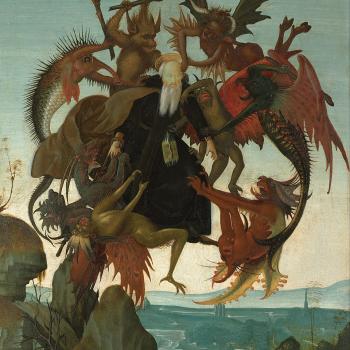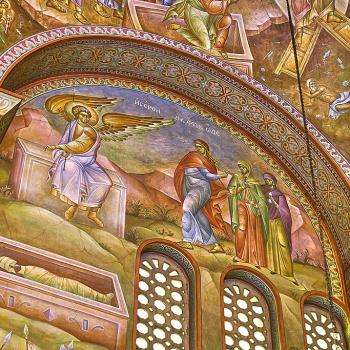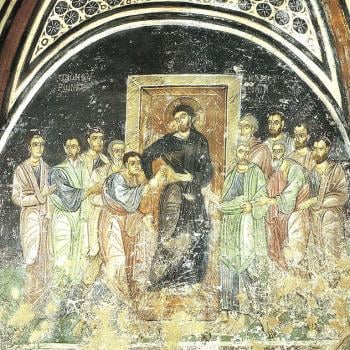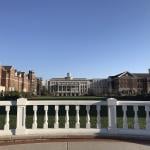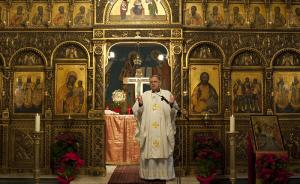
Rejoice, and again, rejoice, celebrate the glory of the resurrection! Let us shout out with cries of joy, “Christ is Risen!” Let us rise with Christ, sharing in the joy and power of the resurrection for ourselves, casting aside those thoughts and practices which would get in the way of our Paschal celebration. We have been given a great grace, a grace which transcends anything we can say or do for ourselves. Indeed, it can be said that all that we could ever do is nothing in comparison to what God offers us. And so, knowing this, we can cast aside all earthly cares, all the fears and guilt for what we have done, and receive the blessings of the resurrection for ourselves. We do not need to kneel in sorrow. We do not need to embrace some sort of false humility. Rather, we should stand up and rejoice, allowing ourselves to be lifted out of our normal thoughts and sorrows. As a way to embrace this spirit, the fathers of the Council of Nicea said that on the Lord’s Day (every Sunday, which is itself a feast participating in the glory of Pascha), and in the days of Pentecost, our prayer should be done standing:
Forasmuch as there are certain persons who kneel on the Lord’s Day and in the days of Pentecost, therefore, to the intent that all things may be uniformly observed everywhere (in every parish), it seems good to the holy Synod that prayer be made to God standing.[1]
The resurrection transforms all things. It is important for us to find ways to experience that transformation here and now even as we know the transformation continues and will have its final fulfillment in the eschaton. The resurrection is proof that the eschaton is immanent, that it affects all creation. Temporal existence does not lie outside of its influence. We can and will experience this in a variety of ways, each of which can influence us in the way we go forward in our lives. As the resurrection changes the world, so we can and should find our own daily lives are changed, and changed for the better. We should do things differently as a way to interact with and realize that change for ourselves. We don’t have to do the same things as we did before. However, as each of us finds our normal way of life different from each other, how we manifest that change will differ; but even a little change can go a long way. For it allows us to open ourselves up even more to the grace revealed in the resurrection, to embrace more of its glory for ourselves, and in doing so, experience more and more of God’s love for us. While this is true throughout the year, this is especially true in regards the Paschal Season. Thus, for example. Abba Helladius, following the spirit of the canons of Nicea, decided that he would show the glory of the resurrection, going beyond his normal ascetic practices, by eating while standing up:
Of the same Abba Helladius, it was said that he was accustomed to eat bread and salt, and that when Easter came, he would say, ‘The brothers eat bread and salt; as for me, I must make a little effort because of Easter. Therefore. Since I eat sitting down all the other days, now that it is Easter, I will make this effort, and eat standing up.”[2]
We might not have the same understanding about kneeling, sitting, and standing, as was had in earlier times, and so the notion of eating while standing up, indeed, of standing up as being a celebratory act, might be some to appreciate and understand. The point is that by standing up, they affirmed their own value and worth, a value and worth which was revealed in the light of Christ’s resurrection. Even ascetics, who often held to a penitential spirit, had to acknowledge the spirit of Pascha and that God, through it, has affirmed the value of creation. Even if they wanted to do what had become routine, what they had been accustomed to throughout the rest of the year, they knew that they must allow the glory of the resurrection to be revealed in their actions. This is why Helladius said he took effort to stand up as he ate. Nicea would have us stand in celebration, stand in glory, and so he took it further, showing that the transformation brought about by the resurrection could and would influence him in all aspects of his life.
Sadly, so many Christians are not taught this. They live their lives in fear and sorrow, always thinking poorly of themselves, always thinking about their sins and never about God’s transcendent love for them. They might hear that God is love, they might hear that God’s love is revealed to us in Christ, especially in Christ’s death and resurrection; they might believe it is true, but they find it difficult to realize that truth for themselves. So many fall down in fear without knowing how to pick themselves up and stand up, accepting God’s love for them. A great many have become so focused on what they have done they do not know how to let the glory of God’s love in. The liturgical practice of standing up on the Lord’s Day, on every Sunday, helped remind the faithful of the transcendent glory of the resurrection and how it should serve as a message of hope. As standing up in this way is no longer universally practiced, many have come to focus on kneeling, even in liturgical celebrations, encouraging us to do so as a way of showing humility and sorrow for our sins. With a kind of worship which no longer reminds us to celebrate with joy all the good God has given to us, we find ourselves far from the joy we should have. Is there any surprise that many Christians often end up despairing of their own salvation when all they hear about is how they have sinned and the suffering they deserve as a result? They are not allowed to celebrate the goodness which already exists in them, the goodness which is reinforced by God’s grace and love, and without that celebration, without that reminder, they lose sight of it; all they know is judgment without grace, judgment without love. Yes, Christians cannot ignore sin, but they must never let it be their focus. Christianity should be about the good news revealed by Jesus. It should focus on the light of grace, the light which shines in the darkness. It should remind us that no matter how dark sin might be, it will never overtake the light. This is one of the great truths revealed to us in the resurrection, and so it should be something consistently presented in the Easter season. We should reflect upon the glory of the light. We should understand how it showed itself to be unconquerable when it faced with the power and darkness of hell. The light shines on, let us embrace it. Let us rise up with it so that we can then stand firm in the glory of the kingdom of God.
[1] Canon 20 of the Council of Nicea in NPNF2(14):42.
[2] The Sayings of the Desert Fathers. trans. Benedicta Ward (Kalamazoo, MI: Cistercian Publications, 1984), 62-3 [Saying of Abba Helladius 2].
Stay in touch! Like A Little Bit of Nothing on Facebook.
If you liked what you read, please consider sharing it with your friends and family!



